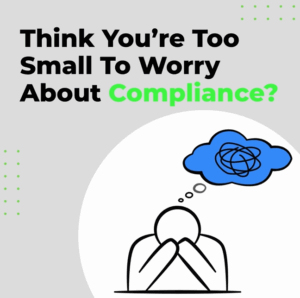Article by TekaByte | Posted on
 For many small business owners, regulatory compliance feels like something reserved for Fortune 500 companies. But here in 2025, that assumption is not only outdated—it’s dangerous.
For many small business owners, regulatory compliance feels like something reserved for Fortune 500 companies. But here in 2025, that assumption is not only outdated—it’s dangerous.Regulatory agencies are no longer focused solely on large corporations. Today, small and mid-sized businesses are squarely in the compliance spotlight. And the consequences for getting it wrong? They’re more severe—and more expensive—than ever.
🔍 Why Compliance Matters More Than Ever
Agencies like:
-
Department of Health and Human Services (HHS)
-
Payment Card Industry Security Standards Council (PCI SSC)
-
Federal Trade Commission (FTC)
…have all stepped up enforcement around data privacy and cybersecurity. And they’re holding everyone accountable, regardless of size.
What’s at stake? Massive fines, lost trust, and in some cases, business closure.
📜 3 Regulations That Could Impact Your Business
1. HIPAA – Health Insurance Portability and Accountability Act
If you handle protected health information (PHI), HIPAA compliance isn’t optional. Updated requirements include:
-
Mandatory encryption of all electronic PHI
-
Routine risk assessments to identify vulnerabilities
-
Employee training on privacy and security
-
Clear incident response plans
💸 Case Example: A small healthcare provider was fined $1.5 million in 2024 due to insufficient safeguards after a breach.
2. PCI DSS – Payment Card Industry Data Security Standard
If you accept credit cards, you’re bound by PCI DSS. Requirements include:
-
Secure storage of cardholder data
-
Regular network monitoring and vulnerability testing
-
Firewalls and encryption protocols
-
Controlled access to sensitive information
📉 Cost of Noncompliance: Fines can range from $5,000 to $100,000 per month depending on severity.
3. FTC Safeguards Rule
If you collect or store consumer financial data, you must:
-
Develop a written information security plan
-
Appoint someone to manage your security measures
-
Conduct regular risk assessments
-
Implement multifactor authentication (MFA)
⛔ Penalties: Up to $100,000 per incident for your business—and $10,000 for individuals held responsible.
🧨 Real Consequences, Real Damage
This isn’t just about red tape.
A small medical office recently suffered a ransomware attack due to outdated security. The result?
-
$250,000 fine from the HHS
-
A public trust crisis
-
A long-term drop in patient volume
They didn’t just lose data—they lost their reputation.
🛠️ 5 Steps to Keep Your Business Compliant
Compliance is more than a legal checklist—it’s a safeguard for your business, your customers, and your peace of mind.
-
Conduct a Full Risk Assessment
Know where your weak points are before someone else finds them. -
Implement Strong Security Measures
Use encryption, firewalls, and MFA to protect sensitive data. -
Train Your Team
Human error is the biggest risk—make sure your staff is educated and prepared. -
Create an Incident Response Plan
Be ready to act fast when something goes wrong. -
Work With a Compliance Partner
You don’t have to navigate this alone. The right IT partner can guide you every step of the way.
🧭 Don’t Let a Blind Spot Become a Breaking Point
If you’re unsure whether your business is fully compliant, now is the time to find out. We offer a FREE Network Assessment designed to uncover hidden risks, strengthen your cybersecurity, and ensure you’re meeting regulatory standards.
🎯 Click here to book your FREE Network Assessment.
You don’t need to be an expert in compliance. You just need the right partner in your corner.
